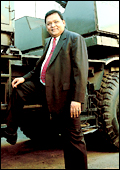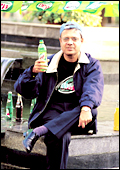|
There
has always been an air of mystery about people who run mighty
corporations. Rising turnovers, soaring profits and booming stock
markets have meant that the country's romance with India Inc.'s
poster boys has grown manifold. Were they merely the right people
at the right place at the right time? Or did they always have
something more fundamentally inherent that predicated their success?
And what does it take to be a super-achiever? BT took these and
many more such questions to some of the top honchos of Indian
business and here's what they think led them to their current
pole positions.
A.M. Naik, 64, CMD, Larsen & Toubro
A.M. Naik thinks it's his devotion beyond
dedication that has brought him this far. He has not taken a day
off from work in the past 20 years and has consistently worked
80 hours a week for the last 40 years, all of which he's spent
with L&T. "In the first 20 years of my career, I worked
for over 100 hours a week," he exults. Naik thinks that the
seeds of his success were sown during the few years he worked
as workshop-in-charge in a small company called Nestler Boilers
in Mumbai (then Bombay). He was 23 and just beginning his career,
but he was still asked to lead a team of 350 people. "The
experience and exposure I got in the workshop boosted my confidence
immensely and made my transition to L&T easy," says Naik,
who is an engineering graduate from BVM College, Anand; he has
also done several executive management programmes at different
stages of his professional life. Another strength is his ability
to keep desperation at bay. "There was a period of stagnation
at L&T for about 12 years. Most people would have got rattled
and left the company. But, I was too committed to my job and my
company," says Naik. But in the end, his patience paid off.
Today, "We Make India Proud" is not just a tagline for
him and his team members. "It is the truth that we have lived
and continue to live. We have been partners in building today's
India," he says proudly. The projects closest to his heart:
the country's first nuclear reactor (1971), the space programme
(1975) and the missile launchers (1980s).
 A.M. Naik/CMD/Larsen & Toubro
A.M. Naik/CMD/Larsen & Toubro
SUCCESS MANTRAS
Satisfaction of being a partner in building the nation
kept A.M. Naik going. He says he is absolutely "committed
to my job and the company".
REGRETS IN LIFE
"I neglected my family a great deal in the course of
my career. If I could relive my life, I would try and spend
more time with my loved ones," he says.
|
 Rajeev
Bakshi/Chairman/PepsiCo India Rajeev
Bakshi/Chairman/PepsiCo India
SUCCESS MANTRAS
"I found my calling in marketing. My excellence lay there
and I got good opportunities to make the best of my inherent
aptitude," he says.
REGRETS IN LIFE
"Life has just been perfect and I wouldn't want anything
to change even if I were given a chance to do so. I have no
regrets," he says. |
Naik has no regrets in life save for one.
"While serving my company and the nation, I neglected my
family a great deal," he laments, adding that if he were
given a chance to relive his life, he would try and spend more
time with his loved ones.
Akhil Gupta, 50, Jt MD, Bharti Tele-Ventures
Akhil Gupta, a Chartered Accountant, started
his career as an independent practitioner in the early eighties.
A few years later, he set up an electronics business in partnership
with a friend. "But I wanted to do something big that would
impact people's lives," he says. That opportunity came in
1994, when he joined Sunil Mittal's Bharti Enterprises. "It
was a big break. We got a big canvas and it was left to us to
fill it with whatever colours we wanted," he says. The rest
is history. Bharti Tele-Ventures, which started with one telecom
circle and a net worth of Rs 150-200 crore, today boasts of a
market capitalisation of Rs 70,000 crore and has 23 circles under
its belt. "It was our hunger for success that drove us. And
success is a never-ending journey," says Gupta, who also
thinks that right partners are imperative for success. "Working
for Sunil is like working for myself. I never felt I was running
somebody else's company. This assurance has been crucial for my
personal and professional success over the last 10 years,"
he adds.
Any regrets? "Early in my career I spent
a lot of time trying to establish my own business. That limited
my horizon. In hindsight, I guess I would have done better off
had I taken up bigger challenges earlier," he says.
Rajeev Bakshi, 48, Chairman, PepsiCo India
For Rajeev Bakshi, who has spent 27 years
in the country's leading fast moving consumer goods companies,
success has been all about pursuing the right opportunities at
the right time. He began his career in 1979 as a Management Trainee
at Lakme. His big break: his appointment as Lakme's Marketing
Head in 1986. "This enabled me to leverage my inner capabilities.
I found my calling in marketing as this was the field where my
excellence lay," says Bakshi. The icing on the cake: he was
handed charge of the overall sales portfolio three years later.
Managing one of India's most high-profile brands and driving its
sales strategy gave Bakshi an unmatched exposure to the Indian
market and readied him for bigger things. In 1992, he moved to
Cadbury India. Those were the early days of economic reforms;
and the atmosphere was rife with both promise and challenge. "I
joined Cadbury as Sales and Marketing Director and five years
later, became its Managing Director," says Bakshi. "It
was the invaluable experience gathered during these two stints
that set me up for my current job at PepsiCo."
For Bakshi, life has just been perfect and
he wouldn't want anything to change even if he were given a chance
to go back into the past. "No regrets. So far so good,"
is how he sums up his journey so far.
|
 Subir
Raha/CMD/ONGC Subir
Raha/CMD/ONGC
SUCCESS MANTRAS
For Subir Raha, it's "making a mark and doing things
one's best, always. Never compromise if you want to be the
best."
REGRETS IN LIFE
"Not becoming a fighter pilot and not being able to
conduct research in electronics engineering," he says.
|
 Akhil
Gupta/Jt MD/Bharti Tele-Ventures Akhil
Gupta/Jt MD/Bharti Tele-Ventures
SUCCESS MANTRAS
For Akhil Gupta, it was the itch to do something big in life
that would impact people at large that has helped him to get
where he is today.
REGRETS IN LIFE
"I set out to chase my dreams pretty late in life. I
would have done better for myself if I had taken up bigger
challenges at an earlier stage," he says. |
Subir Raha, 58, CMD, ONGC
Subir Raha had always wanted to become a
fighter pilot; chose to study electronics engineering; and ended
up working in the oil sector. "When I graduated from Jadhavpur
University in 1969, I had quite a few job offers in hand, but
I chose to join Indian Oil Corporation because it offered the
best salary," laughs Raha. Once in, he decided that even
if oil was not his area of interest, he was going to "make
a mark" there. "There are many ways of doing things.
For me, it always had to be the best way. There was no scope for
any compromises at any point of time," says Raha. "My
motto has always been: 'never take things for granted and verify
everything on your own'," he adds. It is this passion about
making a mark and his desire to see beyond what is immediately
apparent that has seen him evolve into one of the country's most
powerful oilmen. After serving IOC for 31 years in various capacities,
he moved to the then moribund Oil and Natural Gas Corporation
in 2001. A workaholic who's known to send e-mails and SMSs to
colleagues at 1.00 am, his turnaround of the sleepy public sector
oil exploration company into the country's biggest wealth creator
(market capitalisation: Rs 1,59,925 crore as on March 1, 2006)
is the stuff of legends.
If he has any regrets in life, they are over
his failure to become a fighter pilot and his inability to pursue
electronics research. "I would have wanted to take some credit
for all the hardware development that has happened around us in
the recent times," he says, only half in jest.
COUNSELLING
Help, Tarun!
 I am a 30-year-old looking for a career in Clinical Data Management.
I possess an MS degree in veterinary science, a PG degree in IT
and a diploma in CDM. Please suggest an ideal career path to pursue
in India or abroad.
I am a 30-year-old looking for a career in Clinical Data Management.
I possess an MS degree in veterinary science, a PG degree in IT
and a diploma in CDM. Please suggest an ideal career path to pursue
in India or abroad.
There are companies doing outsourcing work in clinical and pharma
trials. Another option could be pharma firms dealing in veterinary
products in their clinical data analysis side, apart from bio-informatics.
I am 31-year-old with a BE (Mechanical).
I work in the purchase department of a manufacturing company and
am also doing MBA from ICFAI. Given my technical background, should
I specialise in finance or operations?
It is difficult to get mbas who want to do
operations and so with your background, you would be an asset
in the operations side. However if your interest lies in finance,
then go ahead and do it.
I am a 20-year-old in final year BA (History).
My father runs a textiles business, but I have no wish to take
it up. I want to pursue higher studies and eventually get into
civil services. I am also keen on doing an MBA. Please advise.
What is it that really interests you? If
you want to join civil services, go ahead, but it's tough to get
in. If it's MBA, then do a full-time course. Figure out your ultimate
goal to find your path.
Answers to your career concerns are contributed
by Tarun Sheth (Senior Consultant) and Shilpa Sheth (Managing
Partner, US practice) of HR firm, Shilputsi Consultants. Write
to Help,Tarun! c/o Business Today, Videocon Tower, Fifth Floor,
E-1, Jhandewalan Extn., New Delhi-110055..
What
Talent Crunch?
India Inc. is unlikely to face any HR constraints
in the foreseeable future.
 |
| Manpower's Basu: It's all about demand
for talent |
The
good news continues to pour in. the latest: there's no talent
shortage in India, says a survey conducted by the us-based Manpower
Inc., one of the world's leading executive search firms. The Talent
Shortage Survey, carried out across 23 countries (sample size:
33,000 employers) reveals that only 13 per cent of Indian employers
expect to face any manpower-related constraints. They feel it
programmers and developers, accountants, marketing and communications
specialists, sales managers; engineers, technical managers, project
managers; administrative assistants and teachers will be hard
to come by over the next couple of years. The worldwide average
is 40 per cent.
Says Soumen Basu, Executive Chairman, Manpower
India: "A turnaround in domestic manufacturing is driving
demand for talent. The age profile of the Indian population, and
the large number of graduates coming into the job market will
largely meet the demand for talent."
-Kumarkaushalam
|







 Subir
Raha/CMD/ONGC
Subir
Raha/CMD/ONGC  Akhil
Gupta/Jt MD/Bharti Tele-Ventures
Akhil
Gupta/Jt MD/Bharti Tele-Ventures  I am a 30-year-old looking for a career in Clinical Data Management.
I possess an MS degree in veterinary science, a PG degree in IT
and a diploma in CDM. Please suggest an ideal career path to pursue
in India or abroad.
I am a 30-year-old looking for a career in Clinical Data Management.
I possess an MS degree in veterinary science, a PG degree in IT
and a diploma in CDM. Please suggest an ideal career path to pursue
in India or abroad. 